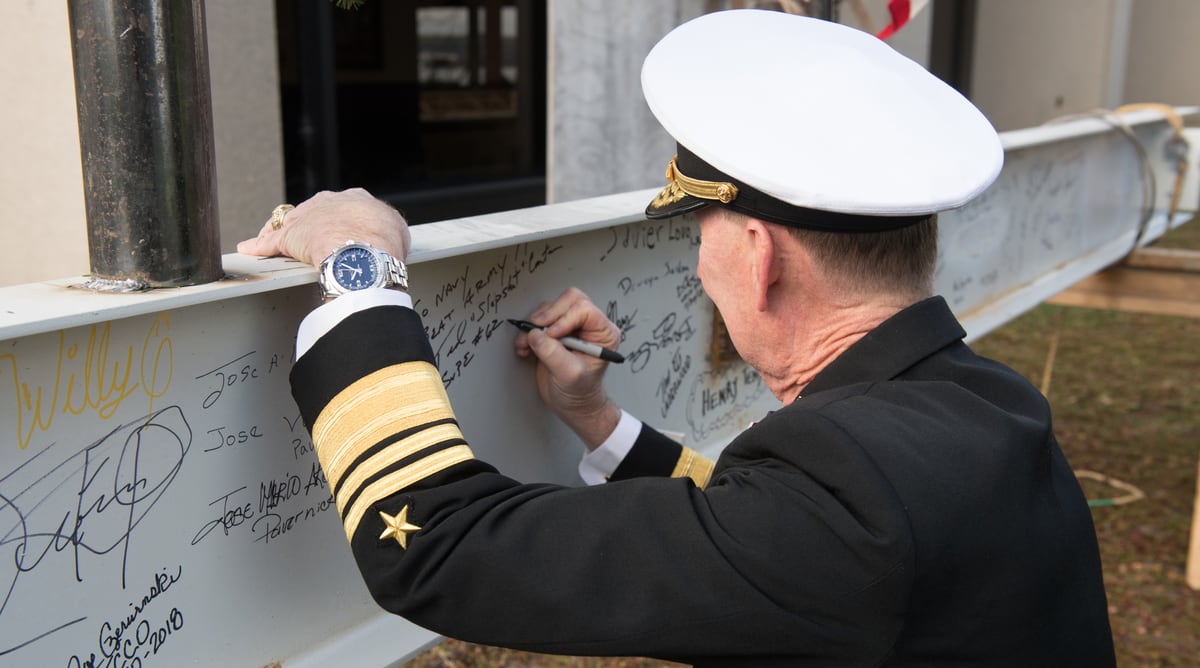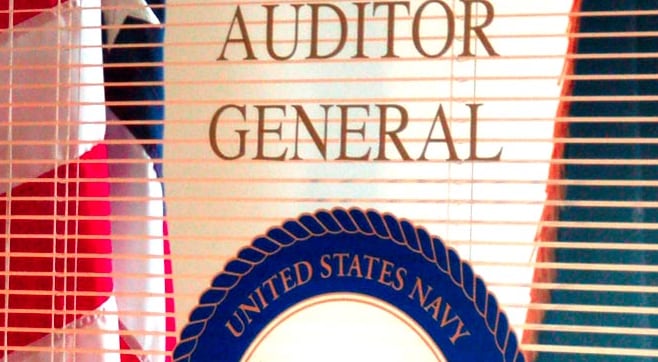In recent years, the Naval Audit Service has reported that overseas personnel were not prepared to respond to a biological, radiological or nuclear incident given the protective equipment on hand.
Auditors unearthed underperforming technical schools, overpayment of benefits and nearly $5 million in potential fraud in fiscal 2020 alone, according to a recent annual report.
The audit service has evaluated security for overseas port visits, submarine cybersecurity and a physically deteriorating U.S. Naval Academy, while assisting the Naval Criminal Investigative Service in its white-collar crime investigations.
But those same auditors are now sounding the alarm over a potential 70 percent cut to the office’s budget over the next two fiscal years, a move they fear could cripple the preeminent oversight entity inside the Department of the Navy, tasked with keeping tabs on the sprawling Navy and Marine Corps enterprises.
The cuts would whittle the department from 290 people to 85 over the next two fiscal years as Big Navy searches for more money it can put toward shipbuilding, according to internal documents obtained by Navy Times.
RELATED

One Naval Audit official who requested anonymity because they were not authorized to speak on the matter said the department’s mandate runs the gamut, from morale and welfare to vessels, sexual assault and housing.
“The function we provide cannot be replicated,” the official said. “We are an integral part of the Navy.”
That official questions how the audit service would do its job under the proposed cuts.
“Once that oversight is not there, I think that presents a huge problem for the taxpayer, for our Marines and sailors, because we are looking out for the programs that they are using,” the official said. “If we are not able to do that, that check is gone.”
As of now, Naval Audit’s budgetary fate has not been finalized.
The planned cuts that have alarmed auditors were submitted by the Navy to the Pentagon in October as part of the Trump administration’s defense budget proposal.
President Joe Biden’s White House is expected to submit its own budget proposal this spring. But Congress ultimately will determine whether such sizeable cuts make it into law.
Navy spokesman Lt. Tim Pietrack said in an email that Naval Audit Service’s budget is $46.1 million this fiscal year, but he declined to discuss future budgets, since the Biden administration’s spending plan remains in the works.
White House officials referred questions to the Pentagon, and Pentagon officials did not respond to requests for comment.
The Naval Audit Service has already absorbed the loss of 70 billets over the past five years, Naval Auditor General Debra Pettitt wrote in a September memo to then-Navy Secretary Kenneth Braithwaite, Chief of Naval Operations Adm. Mike Gilday and Marine Corps Commandant Gen. David Berger.
“I am deeply troubled that the DON’s only internal audit agency is targeted for such a draconian and misguided reduction,” she wrote.
Pettitt declined comment for this story.
RELATED

Naval Audit officials and internal records suggest the department could be facing the axe in order to direct more money to the Navy’s shipbuilding efforts.
An internal update sent by Pettitt to her employees earlier this month states that the cuts are part of the Navy’s “Stem to Stern” budget review started by then-acting Navy Secretary Thomas Modly last year.
The initiative, announced in February 2020, aims to generate $40 billion in savings across the department from FY22 to FY26.
“Getting after this won’t be easy, but it’s entirely possible,” Modly wrote in a Feb. 18, 2020, memo. “(Stem to Stern) will identify low priority, redundant, or legacy capabilities, programs, processes, or headquarters functions that can be realigned, eliminated or reduced to meet the DON’s resource needs.”
Such a cut to the audit service would leave it able to accomplish only “the most critical work,” and would limit its oversight capabilities, Pettitt wrote.
“It appears that DON senior leadership places a higher value on building the fleet than maintaining (the Naval Audit Service) at its current level,” Pettitt wrote in her employee update this month.
In her letter to Braithwaite and the service chiefs in September, Pettitt wrote that her senior team had been engaging with leadership regarding their “highest and/or riskiest” responsibilities, and that the office had seen a 35 percent increase in requested audits compared to its average over the past three fiscal years.
“Every leader with whom we spoke during these outreach efforts expressed the high value they place on our services,” she added.
One idea that has reportedly been floated around is that such oversight could be contracted out to independent public accountants, but Pettitt contended in her letter that Naval Audit’s work extends far beyond financials.
“The budget cut to the Naval Audit Service will destroy the Naval Audit Service’s ability to fulfill its mission,” she warned.
At the same time, officials in the Pentagon Inspector General’s Office “have stated that they cannot absorb our oversight coverage, which would result in inadequate independent oversight of the DON,” she wrote.
“This means that the risks for fraud, waste and abuse within DON programs will escalate exponentially,” Pettitt wrote.

Pettitt floated a 25 percent budget reduction for her office in that memo, but also noted that the Army and Air Force’s audit agencies already enjoy higher end strengths.
“I cannot stress enough the sacrifice to the Department’s transparency and accountability that will be realized if the 70 percent cut to the Naval Audit Service is implemented,” Pettitt warned.
The uncertain fate of the Naval Audit Service comes as the Pentagon is reviewing the roles of oversight offices across the military.
On Jan. 29, then-Deputy Defense Secretary David Norquist notified the services’ inspectors general and auditors general that the Pentagon comptroller would be reviewing such oversight efforts across the department and the services.
“The study will assess whether there is duplication of effort or possible audit gaps and determining whether we can generate savings by eliminating or decreasing spending on non-financial statement audit areas,” he wrote in a memo.
That memo does not indicate when the study will be completed.
Army and Air Force officials declined comment on any proposed budget cuts to their audit services, citing the ongoing nature of the president’s budget proposal.
In addition to losing oversight, one Audit Service official worried that budget cuts, and a large decrease in personnel, would hollow out the service’s institutional knowledge; it already takes three to five years to build a proper auditor.
The official also fears that such cuts are a sign of the Navy’s unwillingness to keep tabs on itself.
“The Navy does not want to be critiqued,” the official said.
Geoff is the managing editor of Military Times, but he still loves writing stories. He covered Iraq and Afghanistan extensively and was a reporter at the Chicago Tribune. He welcomes any and all kinds of tips at geoffz@militarytimes.com.





